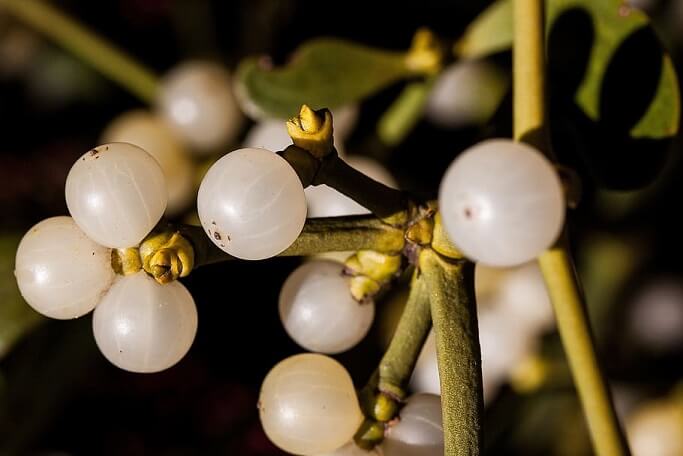By Sayer Ji | Guest Writer
The tradition of kissing under the mistletoe at Christmas can be traced back to ancient Scandinavian rules of war. The story goes that if enemies found themselves standing beneath the mistletoe they had to lay down their arms for the rest of the day.
Peacemaking led to the Christmas kissing tradition. It’s said a young man may kiss a girl under the mistletoe, plucking a poison berry from the bush each time. But when the berries are gone, no more kissing.
Aside from Christmas lore, mistletoe has a long history of medicinal applications among ancient cultures. Some modern scientists are exploring its use as a treatment for colon cancer.
According to the University of Adelaide in Australia, a researcher there is experimenting with an extract of mistletoe. The lab studies focus on whether mistletoe could complement chemotherapy or replace chemotherapy as a treatment for colon cancer.
Colon cancer is the second leading cause of cancer death in the United States according to the Centres for Disease Control.
Zahra Lotfollahi, an honours research student at the University of Adelaide, compared the effectiveness of three different types of mistletoe extract and chemotherapy on colon cancer cells.
Lotfollahi found that one of the mistletoe extracts, from the species Fraxini (which grows on ash trees) was more potent against colon cancer cells in cell cultures compared with chemotherapy. It also increased the potency of chemotherapy when used in conjunction with it.
Fraxini was also found to be less harmful to healthy cells.
For many years, European doctors have considered mistletoe extracts a viable alternative treatment for various cancers. Mistletoe extract is already authorized for use by sufferers of colon cancer in Europe, but not in the United States.
One 2002 German study, published in the journal Alternative Therapies in Health and Medicine, looked at the effects of Iscador, another extract of mistletoe, in over 10,000 patients. The researchers found that patients suffering with colon, rectal, stomach and breast cancer treated with the Iscador extract survived 40% longer than the control group.
Iscador is generally regarded as a complementary cancer therapy. But the researchers noted it is the most commonly used oncological drug in Germany.
A subsequent study found that mistletoe extract may improve overall survival in ovarian cancer patients.
And a 2010 study found mistletoe may act synergistically with chemotherapy in the treatment of pancreatic cancer.
As a medicinal plant, mistletoe has been used traditionally as an antispasmodic for treating convulsive coughing and asthma attacks. It’s also been used to treat epilepsy, hiccups, digestive and uterine cramps.
Actress Suzanne Somers drew attention to mistletoe’s anti-cancer properties when she opted for Iscador treatments in place of chemotherapy during her treatment for breast cancer. She wrote about it in her book, Knockout: Interviews With Doctors Who Are Curing Cancer.
If you want to buy Knockout: Interviews with Doctors Who Are Curing Cancer–And How to Prevent Getting It in the First Place, it’s widely available here.
About the Author
Sayer Ji is the founder of Greenmedinfo.com, a reviewer at the International Journal of Human Nutrition and Functional Medicine, Co-founder and CEO of Systome Biomed, Vice Chairman of the Board of the National Health Federation, and Steering Committee Member of the Global Non-GMO Foundation.
© 2020 GreenMedInfo LLC. This work is reproduced and distributed with the permission of GreenMedInfo LLC. Want to learn more from GreenMedInfo? Sign up for their newsletter here.

